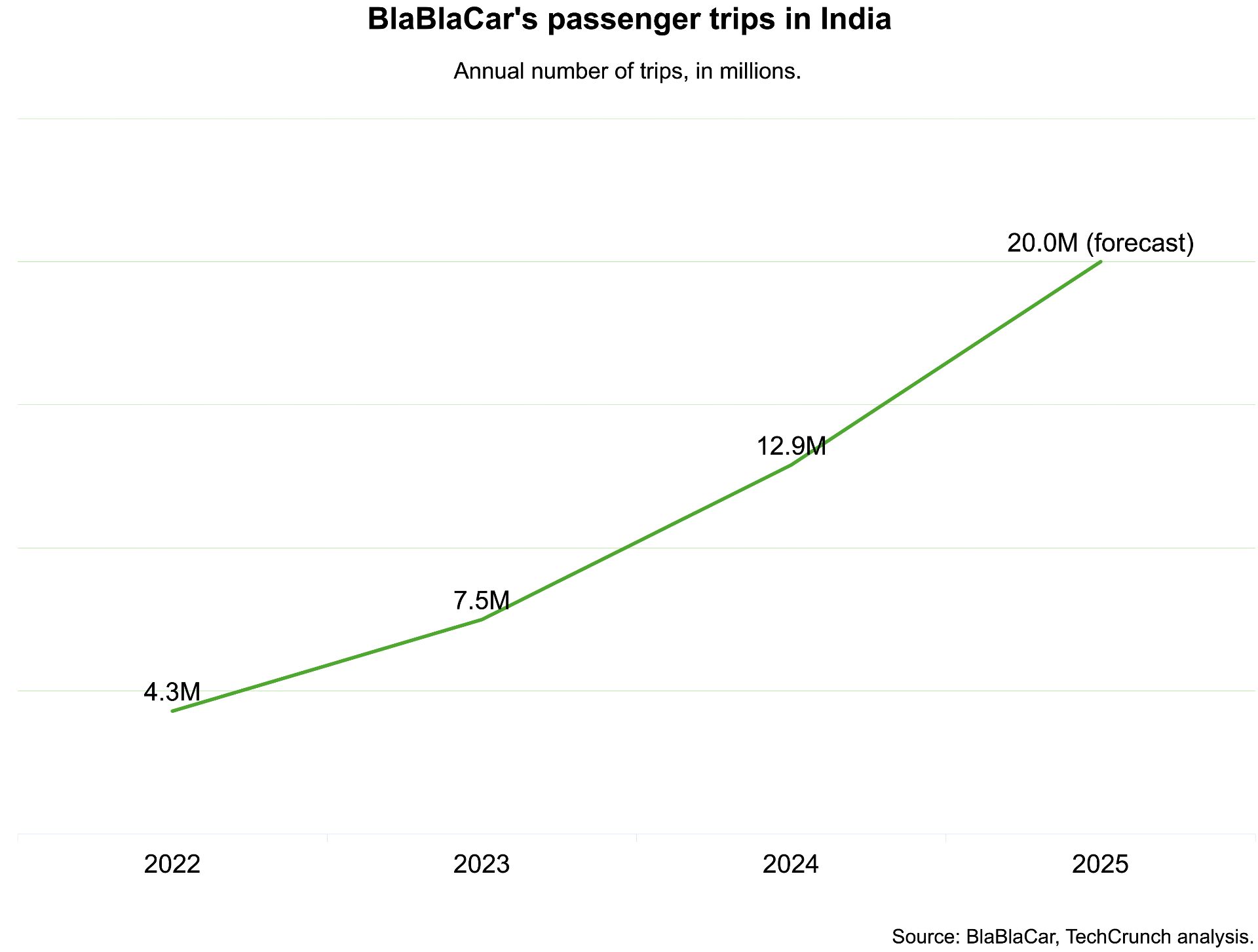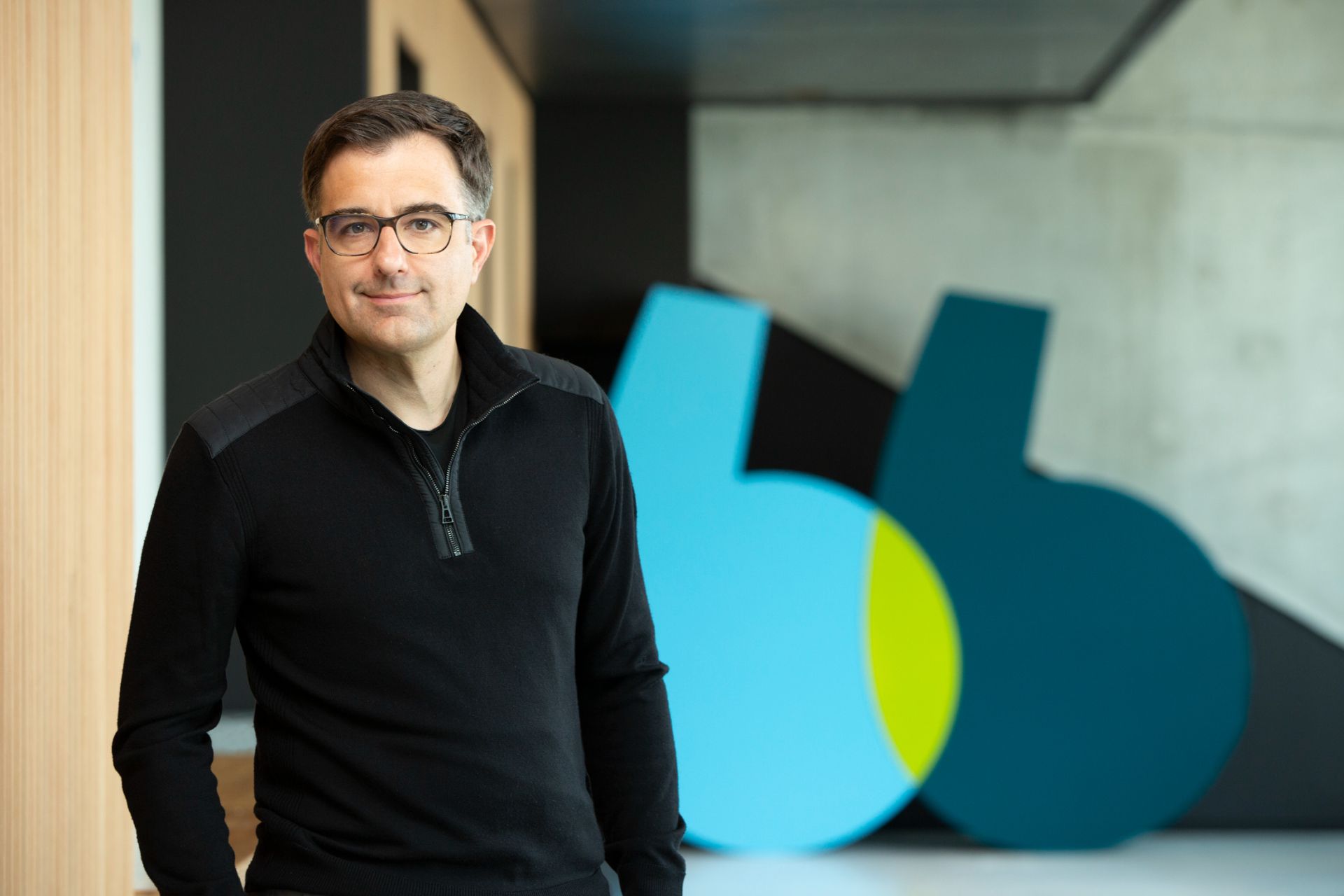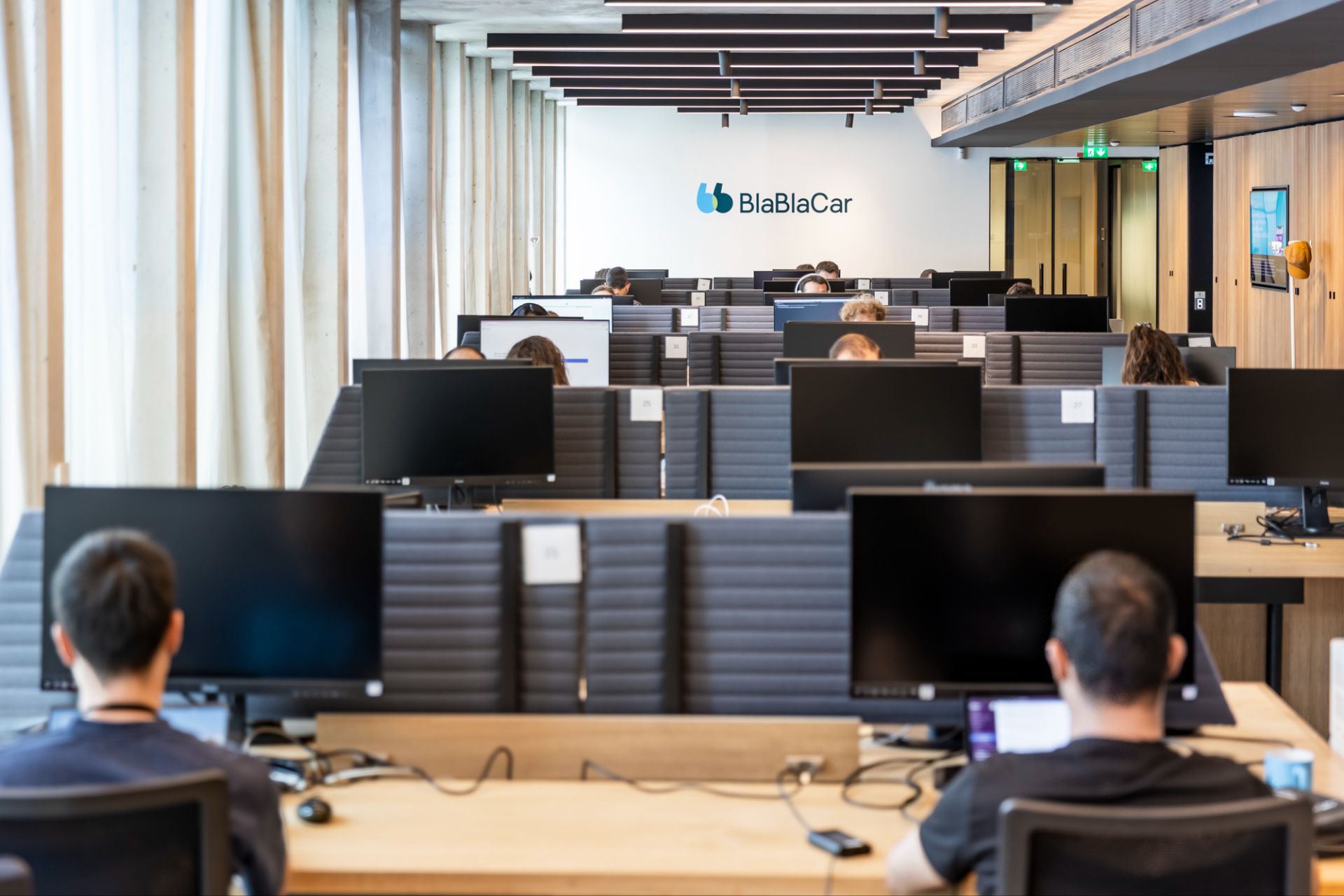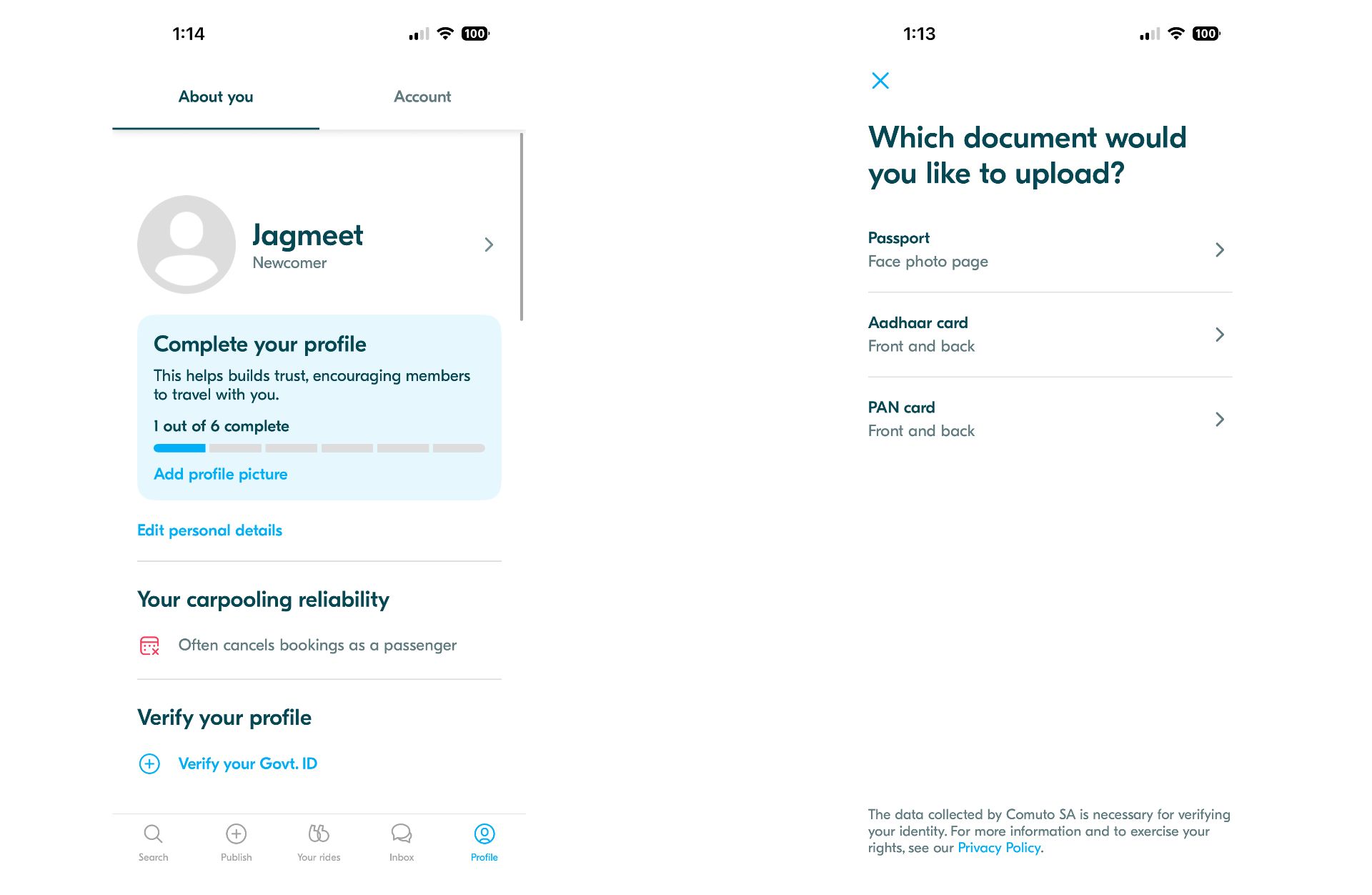Every couple of weekends, 21-year-old student Lavanya Jain uses the BlaBlaCar app to arrange a ride from Noida, near New Delhi, back to his hometown of Kandhla in Uttar Pradesh. The 120-kilometer trip costs him around ₹500 (approximately $6), which is much less than the ₹1,500–₹2,000 ($17–$23) he would spend on a private taxi.
“If you want a quick, convenient, budget-friendly, and comfortable travel option—and enjoy having conversations—you should definitely try BlaBlaCar,” Jain shared with TechCrunch, noting he’s relied on the app about 40 to 50 times in the last two years.
Jain is among the millions in India who are choosing long-distance carpooling as a more affordable and sociable way to travel between cities. This trend has made India BlaBlaCar’s largest market globally, with an estimated 20 million riders expected this year—a nearly 50% increase from last year. If these numbers hold, India will surpass both Brazil’s projected 18 million and France, the company’s home base.
This turnaround is remarkable for a company that closed its India office in 2017 due to low user engagement.
The platform’s expansion has happened mostly without advertising or a local workforce, instead fueled by word of mouth, broader mobile internet access, and the growing use of digital payments and car ownership among India’s middle class.
 Image Credits:Jagmeet Singh / TechCrunch
Image Credits:Jagmeet Singh / TechCrunch India now boasts over 700 million smartphone users and has witnessed a dramatic surge in digital payments, which make up more than 99% of all transactions nationwide.
Central to this transformation is the government-supported Unified Payments Interface (UPI), which handled around 19.6 billion transactions totaling ₹24.9 trillion (about $284 billion) in September alone. Car sales have also risen, reaching 4.73 million in 2024, up from 3.87 million the previous year—a 5.2% annual increase and a record high.
Other reasons for BlaBlaCar’s rapid rise in India include limited public transportation for the country’s 1.4 billion people and ongoing improvements to road networks, which are making it easier to travel between smaller towns, rural regions, and major cities.
“We hear from users who say, ‘Previously, I would fly, take the train, or skip the trip altogether—but now I can drive. It’s a three-hour journey, and it’s enjoyable,’” said Nicolas Brusson, BlaBlaCar’s co-founder and CEO, in an interview.
BlaBlaCar launched in India in early 2015, opening an office in New Delhi. The company soon encountered tough competition from Uber and local player Ola, both of which were testing and heavily promoting their own carpooling services. (These services were later paused during the COVID-19 lockdowns.)
After struggling to gain momentum, BlaBlaCar withdrew its local team in 2017. However, the app stayed online, and by 2022, usage began to climb again. Since then, user numbers have soared from 4.3 million in 2022 to an expected 20 million this year.
This year, BlaBlaCar has averaged about 1.1 million active users per month in India, peaking at 1.5 million in August. Around 75% are riders, with the remaining quarter being drivers. According to the company, India now represents roughly a third of BlaBlaCar’s global carpooling user base.
 BlaBlaCar Co-founder anD CEO Nicolas Brusson Image Credits:BlaBlaCar
BlaBlaCar Co-founder anD CEO Nicolas Brusson Image Credits:BlaBlaCar In terms of trips, India has seen the fastest growth for BlaBlaCar, with 13.5 million journeys completed by September 30, up from 9.1 million in the same period last year. Brazil remains slightly ahead with 14 million trips so far this year compared to 11.7 million in 2023, while France is third with 5.6 million, about the same as last year.
“Our main focus has shifted from our original Western European markets to countries like Japan, Turkey, and especially India,” Brusson told TechCrunch.
Although BlaBlaCar isn’t yet earning revenue from its Indian operations, drivers using the platform made about ₹713 million (roughly $8 million) in August alone, according to the company. On average, drivers earn about ₹390 (around $4) per seat in India, with the typical trip covering 180 kilometers (about 112 miles).
By contrast, drivers in France make about €15 (around $17) per seat, and those in Brazil earn roughly €6.5 (about $7), even though trip lengths are similar in India and Brazil and shorter than France’s average of 250 kilometers (about 155 miles). BlaBlaCar attributes this gap to lower purchasing power and different cost-sharing norms in India.
Almost 70% of BlaBlaCar’s Indian users are between 18 and 34 years old, and about 95% of activity happens via the mobile app. Around half of all rides in India take place on the 15 busiest intercity routes, while the other half are spread across less-traveled corridors—showing that the service is gaining traction beyond major cities. Popular routes include Pune–Thane and Pune–Nashik in Maharashtra, Bengaluru–Chittoor in Andhra Pradesh, and several others connecting mid-sized cities.
“No hurry” to start monetization
 BlaBlaCar HQ in Paris Image Credits:BlaBlaCar
BlaBlaCar HQ in Paris Image Credits:BlaBlaCar Despite this rapid expansion, BlaBlaCar has no immediate plans to monetize its Indian market.
“We’re not rushing to introduce fees or start generating revenue in India. Our priority is to boost usage, and we know how to do that from our experience in other markets,” Brusson told TechCrunch.
Still, BlaBlaCar intends to open a local office in India and make its first hire by the end of this year or early next year, Brusson added.
BlaBlaCar does not see ride-hailing services like Uber and Ola as direct competitors in India. Brusson described those platforms as “demand-driven,” while BlaBlaCar is “supply-driven.” Instead, the company views private car owners and users of trains and buses as its main alternatives.
Challenges on its way to success
BlaBlaCar still encounters several hurdles in India.
State-level rules regarding carpooling remain unclear, leading to scrutiny in some cities. Some users, including Jain, have noted difficulties in reaching BlaBlaCar’s customer service, which often responds with automated replies. The company explained to TechCrunch that it uses a “blended model,” with most daily queries handled by an outsourced local team and more complex issues managed by a smaller group at its Paris headquarters.
To enhance safety, BlaBlaCar rolled out an ID Check feature in India, allowing users to verify their identity with government-issued documents—a feature now available globally. However, TechCrunch found that users can still book or offer rides even if their ID verification is incomplete.
“This is an intentional design to make it easier for newcomers to join the platform,” the company responded. “ID checks are just one aspect of our broader trust and safety system; we rely on multiple layers to foster confidence within our community.”
 Image Credits:Jagmeet Singh / TechCrunch
Image Credits:Jagmeet Singh / TechCrunch The company added that over 70% of trips in India are with drivers who have completed government ID verification. BlaBlaCar also features user reviews and ratings, and verifies accounts through phone numbers and email addresses.
“We strongly encourage users to complete all verification steps, as fully verified profiles—with both a photo and ID—are much more likely to attract carpool partners. Incomplete profiles tend to get fewer bookings,” the company said.
Some Indian users have also expressed frustration when drivers or passengers cancel at the last minute, sometimes even after arriving at the meeting point. Additionally, the app currently lacks a live location-sharing feature, which Jain pointed out makes it harder to book rides for family or friends.
BlaBlaCar has tailored its service for Indian users by adding features like “meeting-point logic” to simplify coordination. Unlike France, where there are designated carpool pickup zones, India does not have fixed locations. Drivers and riders usually agree to meet at convenient spots along the route, such as a petrol station or near a highway exit. The app now suggests and displays these meeting points using a combination of machine learning and user feedback, helping to minimize detours and better suit India’s infrastructure, according to the company.
Globally, BlaBlaCar expects to serve around 150 million passengers this year, including those using its bus services, which are available in countries like France but not yet in India. As BlaBlaCar expands its international reach, India’s unexpected growth has made it a central focus for the company’s next stage of development.